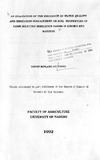| dc.contributor.author | Tonui, DK | |
| dc.date.accessioned | 2013-05-15T09:06:28Z | |
| dc.date.available | 2013-05-15T09:06:28Z | |
| dc.date.issued | 1992 | |
| dc.identifier.citation | Tonui, D.K(1992). An evaluation of the influence of water quality and irrigation management on soil properties of some selected irrigation farms in Kiboko and Makindu | en |
| dc.identifier.uri | http://erepository.uonbi.ac.ke:8080/xmlui/handle/123456789/23062 | |
| dc.description | Msc Thesis | en |
| dc.description.abstract | Three irrigation farms were studied. Two in Makindu and one
in Kiboko. Representative soil sampling sites were selected to
represent irrigated and non-irrigated soils. The physical and
chemical properties were determined in the laboratory. This
was done to study the influence of water quality and
management on soil properties.
Water samples used for irrigation were analysed to determine
their chemical characteristics and their suitability for irrigation.
From irrigation point of view, all the waters may be regarded as
being unsafe for irrigation particularly on heavy textured soils,
unless sufficient drainage is provided and the necessary soil
amendments are adopted or salt tolerant crops are grown .
.This study has indicated that poor quality irrigation water
have little impact on light textured soils. The criteria used to
classify soils as well as irrigation waters as having high salinity
hazard are not tenable for well drained light textured soils and
therefore need modification. Due consideration should be given
to soil type, drainage characteristics, topography and irrigation
management when judging the suitability of irrigation water.
Sufficient drainage should be provided to lower Muhindi farm
in order to reduce the groundwater level to below the zone of
toot penetration.
The waterlogging condition experienced in Makwatta farm is
attributable to the dispersed clay colloids brought about by high
ESP of the soils. The dispersed colloids moved and blocked the
pores through which water flows thus diminishing the hydraulic
conductivity of these soils. The pH of these soils is more then
8.5 due to the hydrolysis of adsorbed sodium. Soil amendments
would be of doubtful value in correcting the high exchangeable
sodium status of the subsoils due to their extremely low
permeabilities. Ploughing under of farmyard manure or greenmanuring
crops might help improve drainage.
The irrigated surface soils of Musengya farm in Makindu are
well drained and no appreciable increase in salt accumulation
has been experienced despite the use of high salinity water of
Makindu river for irrigation. Sufficient drainage should be
provided to the fine textured soils of Museng'ya farm in order to
reduce the groundwater level to below the root zone and
prevent the occurrence of waterlogging condition.
Single correlations between irrigation water and soil
characteristics were not significant to be of any prediction value
suggesting that the soil solution is not in equilibrium with
irrigation water. | en |
| dc.description.sponsorship | University of Nairobi | en |
| dc.language.iso | en | en |
| dc.subject | Water quality | en |
| dc.subject | Irrigation management | en |
| dc.subject | Soil properties | en |
| dc.subject | Kiboko | en |
| dc.subject | Makindu | en |
| dc.title | An evaluation of the influence of water quality and irrigation management on soil properties of some selected irrigation farms in Kiboko and Makindu | en |
| dc.type | Thesis | en |
| local.publisher | Department of soil science, University of Nairobi | en |

